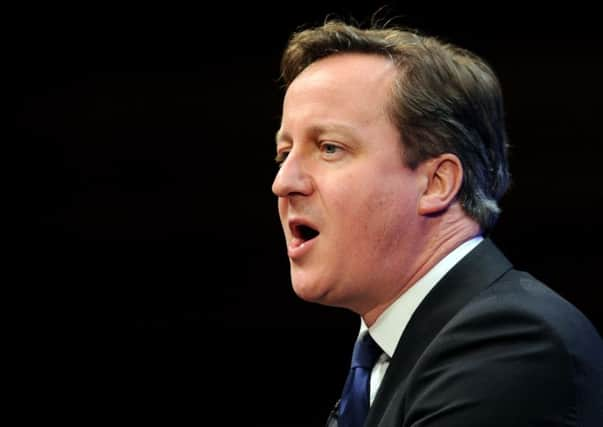PM pledges tax credits cut for those on low wages


In a major speech the Prime Minister criticised the current welfare system – raising expectations that tax credits are in line for significant reductions when the details of cuts are laid out next month.
His speech came ahead of an emergency Budget on 8 July where Chancellor George Osborne has confirmed that he will set out £12bn of welfare cuts which will exclude protected areas such as the state pension and benefits for the elderly as well as childcare.
Advertisement
Hide AdAdvertisement
Hide AdIn his speech in Runcorn yesterday, Mr Cameron argued that welfare payments for low wages “ignore the causes and simply treat the symptoms of the social and economic problems we face”.
“There is what I would call a merry-go-round: people working on the minimum wage, having that money taxed by the government and then the government giving them that money back – and more – in welfare,” he said.
He insisted that Britain needed to become “a higher-wage, lower-tax, lower-welfare society” rather than simply dealing with “symptoms” of low pay by topping up people’s pay packets.
He went on: “We need to move from a low-wage, high-tax, high-welfare society to a higher-wage, lower-tax, lower- welfare society.”
Mr Cameron insisted that the government was determined to tackle the root causes of inequality and not just the symptoms.
“The right track is to recognise the causes of stalled social mobility and a lack of economic opportunity,” he said.
“Family breakdown. Debt. Addiction. Poor schools. Lack of skills. Unemployment. People capable of work, written off to a lifetime on benefits. Recognise those causes, and the solutions follow. Strong families that give children the best start in life. A great education system that helps everyone get on. A welfare system that encourages work – well-paid work.
“These are the drivers of opportunity – and we need to extend them.”
Advertisement
Hide AdAdvertisement
Hide AdMr Cameron highlighted three strands of his plan to improve social mobility.
Firstly he promised that families will be strengthened with better childcare, flexible working and relationship support, as well as a faster adoption process and an expansion of the Troubled Families programme to help 400,000 families over the next five years.
Secondly, he said there would be a focus on “first-class” education, with “zero tolerance” of failing schools and a new focus to tackle “coasting schools”.
Finally he said that a priority would be creating well-paid jobs, increasing the minimum wage from £6.50 to £6.70 in October and the personal tax threshold to £12,500 over the next five years and “going further” as the economy recovers and welfare is reformed.
But despite claiming that his vision was for a “One-Nation Britain” and “blue-collar Conservatism”, critics yesterday accused him of going after the working poor to make savings.
TUC general secretary Frances O’Grady said: “The government has smashed the myth that it is the party for blue-collar workers. Tax credits play a vital role in making sure the UK’s working families are better off in work. Cutting this crucial benefit will consign millions of hard-working families and their children to living on the poverty line.
“Even if they secured decent pay rises well above the minimum wage, as well as income tax cuts, millions of working households would still rely on tax credits to survive. The best way to make work pay for families is to deliver better wages while protecting tax credit entitlements.”
Labour leadership frontrunner Andy Burnham said it was “disgraceful” that ministers had yet to spell out where the cuts would fall and questioned whether they had a mandate from the electorate, while Labour leadership contender Jeremy Corbyn said: “In the face of huge opposition to austerity policies on the streets this weekend, David Cameron says his government remains committed to austerity and have no plan for prosperity or economic growth.
Advertisement
Hide AdAdvertisement
Hide Ad“Why do Cameron and Osborne refuse to get the huge body of evidence that introducing the living wage is the surest, most effective method of ending benefit pay-outs to the in-work but still poor?”
He added: “Billions would be saved by the public purse if the UK’s nearly five million low-paid workers received a raise to the living wage of £9.15 an hour in London and £7.85 outside London.”
The SNP said that the Prime Minister’s speech had undermined his claim to represent one-nation politics and “blue-collar Conservatism”.
SNP MSP Linda Fabiani said: “David Cameron’s rhetoric and his government’s actions are completely at odds – he talks about wanting a high-wage economy whilst keeping the minimum wage low and failing to sign his own government up to the living wage.
“Instead of boosting the minimum wage, ending the failed commitment to austerity and investing in jobs and infrastructure, David Cameron’s big idea to strengthen the economy is to cut another £12bn from the welfare budget as his attack on the working poor and vulnerable people intensifies.”
She insisted that the speech made the case for more welfare powers to be devolved to Scotland beyond the Smith Commission proposals of being able to top up every benefit.
She said: “The Tory plans aren’t just economically illiterate – they are morally wrong and show we need full powers over the economy and social security transferred to Scotland.
“With these key powers in Scotland’s hands, we can take real action to deliver a strong economy which works in everyone’s interests and a fair society in which people who need help are supported rather than punished by a Tory government intent on balancing the books on the backs of the poor.”